后缀判断词性
由英语单词后缀判定词性

由英语单词后缀判定词性后是一种重要的构法,通后常常可以判断出一个的性。
一个英可以分三个局部:前〔 prefix〕,根〔 stem〕及后〔 suffix 〕。
中位于根前面的局部就是前。
前,可以改的意思。
在言学里,后,又称尾,是一种后置于其他素后的。
后 -名解以英例: establish〔〕 + -ment 〔后〕— > establishment 〔名〕:借由后 -ment 的使用,使原本的素名,言的衍生,是后的一种用途后 -名后常的此后及其具体含如下:1.-ster,-eer,-er〔or 〕意:从事某种或参与某种活的人〔person engaged in anoccupation or activity 〕例:gamester ,gangster,songster,engineer ,profiteer ,mountaineer ,auctioneer ,driver , teacher ,director , actor , professor2.-let 意:小或者不重要的西〔small,unimportant things 〕例: booklet ,leaflet ,starlet3.-ette 意:1〕小的西〔 small〕例:cigarette 2 〕假的西〔 imitation 〕例:leatherette3〕女性〔 female 〕例:usherette4. -ess 意:女性〔 female 〕例: actress, poetess, hostess, paintress5. -hood 意:期〔 status; etc .〕例: boyhood , childhood , manhood6. -ship 意:才能,状,格,品等〔skill, state, condition , status, quality 〕例: leadership , friendship , membership , lectureship ,sportsmanship7.-ful 意:量〔 the amount which noun contains 〕例: cupful , handful , mouthful , spoonful8.-tion ,-ion 意: 1〕状,行等〔 state;action ;etc.〕例: action ,oppression ,possession,education ,starva- tion 2 〕机构等〔institution ;etc.〕例: organization ,foundation 9.-ment 意:状,行等〔state; action; etc.〕例: movement ,enslavement ,pavement10. -al 意:作〔 action 〕例: arrival , refusal, revival , recital , removal11.-age 意:程度,数量等〔extent ; amount ;etc.〕例:wastage,coverage, acreage,shrinkage,breakage, hostage912.-ness;-ity〔 ty〕意:状,品〔 state;quality ;etc .〕例:happiness, usefulness,selfishness,kindness ,rapidity , activity , sanity , changeability13.-ism 意:道,主,学等〔 doctrine of ,practice of 〕例:idealism , impressionism ,absenteeism ,racism后 -后常的此后及其具体含如下:1.-ify 意:,〔 to turn into ,to make or become 〕例: beautify , diversify , simplify2.-ize;-en 意:使⋯⋯,得⋯⋯〔 to make or become;to make into〕例:modernize,popularize , legalize, hospitalize ,symbolize, ripen ,widen , heighten , threaten3.-ate 意:增加,使⋯⋯听写〔 give or add,make or become 〕例:originate , hydrogenate , validate ,differentiate后 -形容后常的此后及其具体含如下:1.-ful 意:充,有〔 full of ;hav- ing;giving;etc.〕例: useful ,pitiful , hopeful ,careful,helpful , forgetful ,thankful , fearful2. -less 意:没有,无〔without ; not giving 〕例: speechless, childless,harmless,hopeless, meaningless ,homeless3.-ly 意:有⋯⋯品的〔having the qualities of 〕例: beastly,manly , brotherly ,friendly4. -like 意:像⋯⋯的〔like〕例:childlike , statesmanlike ,tiger-like5. -y; -ish 意:像⋯⋯一般的〔somewhat like 〕例: meaty , sandy, silky, hairy,leafy, watery , foolish , girlish ,blackish , thinnish6.-some 意:像⋯⋯一的;引起⋯⋯的;有⋯⋯品的〔 like;causing; having thequality of 〕例: troublesome , burdensome , wholesome , tiresome , bothersome 7.-able〔ible 〕意:能⋯⋯的;可以⋯⋯的〔 able to be ;capable〕例: changeable,realiable,readable , drinkable , comfortable ,expansible ,convincible8.-ed 意:有⋯⋯的〔 having,etc.〕例: wooded ,pointed ,moneyed , odd-shaped9.-al 意:有⋯⋯属性的,⋯⋯型的〔 nature of ,typical of 〕例: cultural ,personal,regional ,musical10. -ary〔 ory〕意:属于⋯⋯的,与⋯⋯相的〔: revolutionary , imaginary , contradictory 11. -ous 意:富含⋯⋯的;有⋯⋯品的;像⋯⋯的〔belonging to; connected with 〕例 fullof ; having the quality of ;like〕例: glorious,erroneous , malicious , gracious12.-ic〔 ical〕意:⋯⋯的;属于⋯⋯的〔 typical of ;belonging to 〕例: historic , historical , methodic ,methodical , dramatic , heroic13. -ive 意:有⋯⋯属性的;有某种向的〔having the nature or quality of;given or tending to 〕例: attractive , talkative , restrictive , defensive , preventive ,constructive , sensitive后 -副后常的此后及其具体含如下:1. -ly 意:以⋯⋯方式〔in a...manner ; etc.〕例: happily, boldly , attentive- ly ,strangely2.-ward〔 s〕意:表示方式或作的方向〔manner and direction of movement〕例:onward 〔 s〕, backward 〔s〕, earthward 〔 s〕, homeward 〔 s〕, eastward 〔 s〕3.-wise 意: 1〕按照⋯⋯方式〔 in the manner of 〕例: crabwise,clockwise2〕就⋯⋯而言〔 asfar as ...is concerned〕例: weatherwise,educationwise4.以 ly 后尾的副,比都是 +more ,如 more carefully ,more useful 最高 +most如 most carefully ,most useful。
英语词汇词性辨析方法
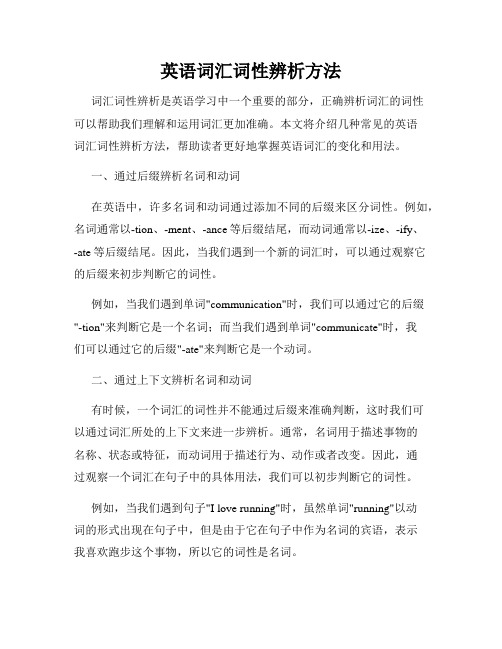
英语词汇词性辨析方法词汇词性辨析是英语学习中一个重要的部分,正确辨析词汇的词性可以帮助我们理解和运用词汇更加准确。
本文将介绍几种常见的英语词汇词性辨析方法,帮助读者更好地掌握英语词汇的变化和用法。
一、通过后缀辨析名词和动词在英语中,许多名词和动词通过添加不同的后缀来区分词性。
例如,名词通常以-tion、-ment、-ance等后缀结尾,而动词通常以-ize、-ify、-ate等后缀结尾。
因此,当我们遇到一个新的词汇时,可以通过观察它的后缀来初步判断它的词性。
例如,当我们遇到单词"communication"时,我们可以通过它的后缀"-tion"来判断它是一个名词;而当我们遇到单词"communicate"时,我们可以通过它的后缀"-ate"来判断它是一个动词。
二、通过上下文辨析名词和动词有时候,一个词汇的词性并不能通过后缀来准确判断,这时我们可以通过词汇所处的上下文来进一步辨析。
通常,名词用于描述事物的名称、状态或特征,而动词用于描述行为、动作或者改变。
因此,通过观察一个词汇在句子中的具体用法,我们可以初步判断它的词性。
例如,当我们遇到句子"I love running"时,虽然单词"running"以动词的形式出现在句子中,但是由于它在句子中作为名词的宾语,表示我喜欢跑步这个事物,所以它的词性是名词。
三、通过词义辨析形容词和副词形容词用于修饰名词,描述事物的特征或状态,而副词用于修饰动词、形容词或其他副词,描述行为的方式、程度或频率。
因此,通过观察一个词汇在句子中所起的修饰作用,我们可以初步判断它的词性。
例如,当我们遇到句子"She sings beautifully"时,单词"beautifully"用于修饰动词"sings",描述她的歌唱方式,所以它的词性是副词。
英语后缀词性
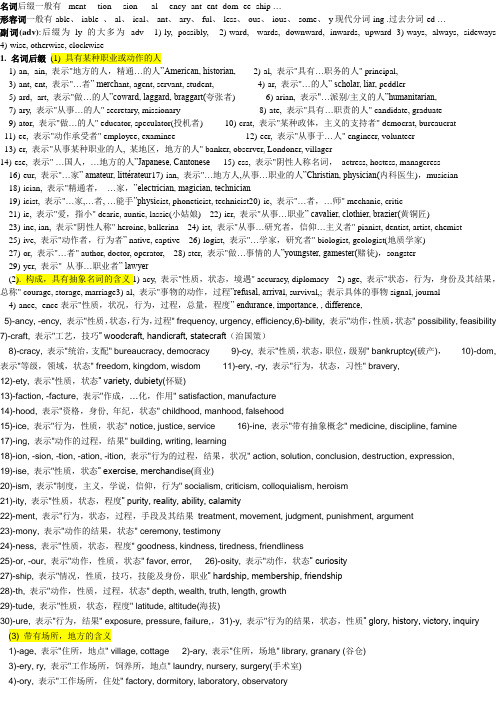
名词后缀一般有-ment -tion -sion - al -ency -ant -ent -dom -ee -ship …形容词一般有-able、-iable 、-al、-ical、-ant、-ary、-ful、-less、-ous、-ious、-some、-y现代分词-ing .过去分词-ed …副词(adv):后缀为ly的大多为adv1)-ly, possibly, 2)-ward, -wards, downward, inwards, upward 3)-ways, always, sideways 4)-wise, otherwise, clockwise1. 名词后缀(1) 具有某种职业或动作的人1)-an, -ain, 表示"地方的人,精通…的人”American, historian,2)-al, 表示"具有…职务的人" principal, 3)-ant,-ent, 表示"…者” merch ant, agent, servant, student, 4)-ar, 表示"…的人” scholar, liar, peddler 5)-ard, -art, 表示"做…的人”coward, laggard, braggart(夸张者) 6)-arian, 表示"…派别/主义的人”humanitarian, 7)-ary, 表示"从事…的人" secretary, missionary 8)-ate, 表示"具有…职责的人" candidate, graduate 9)-ator, 表示"做…的人" educator, speculator(投机者) 10)-crat, 表示"某种政体,主义的支持者" democrat, bureaucrat 11)-ee, 表示"动作承受者" employee, examinee 12)-eer, 表示"从事于…人" engineer, volunteer13)-er, 表示"从事某种职业的人, 某地区,地方的人" banker, observer, Londoner, villager14)-ese, 表示" …国人,…地方的人”Japanese, Cantonese15)-ess, 表示"阴性人称名词,actress, hostess, manageress 16)-eur, 表示"…家” amateur, littérateur17)-ian, 表示"…地方人,从事…职业的人”Christian, physician(内科医生),musician18)-ician, 表示"精通者,…家,”electrician, magician, technician19)-icist, 表示"…家,…者, …能手”physi cist, phoneticist, technicist20)-ic, 表示"…者,…师" mechanic, critic 21)-ie, 表示"爱,指小" dearie, auntie, lassie(小姑娘) 22)-ier, 表示"从事…职业” cavalier, clothier, brazier(黄铜匠) 23)-ine, ian, 表示"阴性人称" heroine, ballerina 24)-ist, 表示"从事…研究者,信仰…主义者" pianist, dentist, artist, chemist 25)-ive, 表示"动作者,行为者” native, captive 26)-logist, 表示"…学家,研究者" biologist, geologist(地质学家) 27)-or, 表示"…者" author, doctor, operator, 28)-ster, 表示"做…事情的人”youngster, gamester(赌徒),songster 29)-yer, 表示" 从事…职业者” lawyer(2). 构成,具有抽象名词的含义1)-acy, 表示"性质,状态,境遇" accuracy, diplomacy 2)-age, 表示"状态,行为,身份及其结果,总称" courage, storage, marriage3)-al, 表示"事物的动作,过程”refusal, arriva l, survival,; 表示具体的事物signal, journal4)-ance, -ence表示"性质,状况,行为,过程,总量,程度” endurance, importance, , difference,5)-ancy, -ency, 表示"性质,状态,行为,过程" frequency, urgency, efficiency,6)-bility, 表示"动作,性质,状态" possibility, feasibility7)-craft, 表示"工艺,技巧” woodcraft, handicraft, statecraft(治国策)8)-cracy, 表示"统治,支配" bureaucracy, democracy 9)-cy, 表示"性质,状态,职位,级别" bankruptcy(破产),10)-dom,表示"等级,领域,状态" freedom, kingdom, wisdom 11)-ery, -ry, 表示"行为,状态,习性" bravery,12)-ety, 表示"性质,状态” variety, dubiety(怀疑)13)-faction, -facture, 表示"作成,…化,作用" satisfaction, manufacture14)-hood, 表示"资格,身份, 年纪,状态" childhood, manhood, falsehood15)-ice, 表示"行为,性质,状态" notice, justice, service 16)-ine, 表示"带有抽象概念" medicine, discipline, famine17)-ing, 表示"动作的过程,结果" building, writing, learning18)-ion, -sion, -tion, -ation, -ition, 表示"行为的过程,结果,状况" action, solution, conclusion, destruction, expression,19)-ise, 表示"性质,状态” exercise, mercha ndise(商业)20)-ism, 表示"制度,主义,学说,信仰,行为" socialism, criticism, colloquialism, heroism21)-ity, 表示"性质,状态,程度” purity, reality, ability, calamity22)-ment, 表示"行为,状态,过程,手段及其结果treatment, movement, judgment, punishment, argument23)-mony, 表示"动作的结果,状态" ceremony, testimony24)-ness, 表示"性质,状态,程度" goodness, kindness, tiredness, friendliness25)-or, -our, 表示"动作,性质,状态" favor, error, 26)-osity, 表示"动作,状态” curiosity27)-ship, 表示"情况,性质,技巧,技能及身份,职业” hardship, membership, friendship28)-th, 表示"动作,性质,过程,状态" depth, wealth, truth, length, growth29)-tude, 表示"性质,状态,程度" latitude, altitude(海拔)30)-ure, 表示"行为,结果" exposure, pressure, failure,,31)-y, 表示"行为的结果,状态,性质” glory, history, victory, inquiry (3) 带有场所,地方的含义1)-age, 表示"住所,地点" village, cottage 2)-ary, 表示"住所,场地" library, granary (谷仓)3)-ery, ry, 表示"工作场所,饲养所,地点" laundry, nursery, surgery(手术室)4)-ory, 表示"工作场所,住处" factory, dormitory, laboratory, observatory(4) 带有学术,科技含义1)-grapy, 表示"…学,写法” biog raphy, calligraphy, geography 2)-ic, ics, 表示"…学…法" logic, mechanics, optics, electronics 3)-ology, 表示"…学…论”biology, zoology, technology(工艺学) 4)-nomy, 表示"…学…术" astronomy, economy, bionomy(生态学5)-ery, 表示"学科,技术" chemistry, cookery, machinery 6)-y, 表示"…学,术,法” photography, philosophy (5) 表示人和事物的总和,集合含义1)-age, baggage, tonnage 2)-dom, newspaperdom(新闻界) 3)-hood, neighbourhood, womanhood 4)-ery, cavalry, ministry(内阁) 5)-ure, legislature, judicature(6) 表示物品和物质名称的含义1)-ant, ent, solvent, constant 2)-al, signal, pictorial(画报) 3)ar, collar, pillar(石柱)4)- er, boiler, computer, washer, cooker 5)-ery, drapery(绸缎) 6)-ing, clothing, matting,7)-ment, instrument, equipment, attachment(7) 表示“细小”的含义1)-cle, particle, 2)-cule, molecule(分子) 3)-el, parcel 4)-en, chicken, maiden 5)-et, pocket, ticket6)-etta, -ette, etto, cigarette, essayette(短文) 7)-kin, napkin 8)-ling, duckling, 9)-let, booklet 10)-y, baby, doggy 2. 形容词后缀(1)带有“属性,倾向,相关”的含义1)-able, -ible, movable, comfortable, 2)-al, natural, additional, educational 3)-an, ane, urban, suburban, republican 4)-ant, -ent, distant, important, excellent 5)-ar, similar, popular, regular 6)-ary, military, voluntary7)-ice, -atie, ical, politic, systematic, historic, physical, 8)-ine, masculine, feminine, marine 9)-ing, moving, touching, daring 10)-ish, foolish, bookish, selfish 11)-ive, active, impressive, decisive 12)-ory, satisfactory, compulsory 13)-il, -ile, -eel, fragile, genteel(文雅的)(2) 表示“相象,类似”的含义1)-ish, boyish, childish 2)-esque, picturesque 3)-like, manlike, childlike4)-ly, manly, fatherly, scholarly, motherly 5)-some, troublesome, handsome 6)-y, milky, pasty(3) 表示“充分的”含义1)-ful, beautiful, wonderful, helpful, truthful 2)-ous, dangerous, generous, courageous, various 3)-ent, violent (4) 表示由某种物质形成,制成或生产的含义1)-en, wooden, golden, woolen 2)-ous, gaseous 3)-fic, scientific(5) 表示方向的含义1)-ern, eastern, western 2)-ward, downward, forward(6) 表示“倍数”的含义1)-ble, double, treble 2)ple, triple 3)-fold, twofold, tenfold(7) 表示“数量关系”的含义1)-teen, thirteen 2)-ty, fifty 3)-th, fourth, fiftieth(8) 表示国籍,语种,宗教的含义1)-an, Roman, European 2)-ese, Chinese, 3)-ish, English, Spanish(9) 表示“比较程度”的含义1)-er, greater 2)-ish, reddish, yellowish 3)-est, highest 4)-most, foremost, topmost(10)其他的含义: -less, 表示否定,countless, stainless, wireless3. 动词后缀1)-ize, ise, 表示"做成,变成,…化“modernize, mechanize, democratize, organize2)-en, 表示"使成为,引起,使有” quicken, weaken, soften, harden3)-ify, 表示"使…化, 使成”beautify, purify, intensify, signify, simplify4)-ish, 表示"使,令” finish, abolish, diminish, establish5)-ate, 表示“成为…,处理,作用” separate, operate, indicate。
词性转换
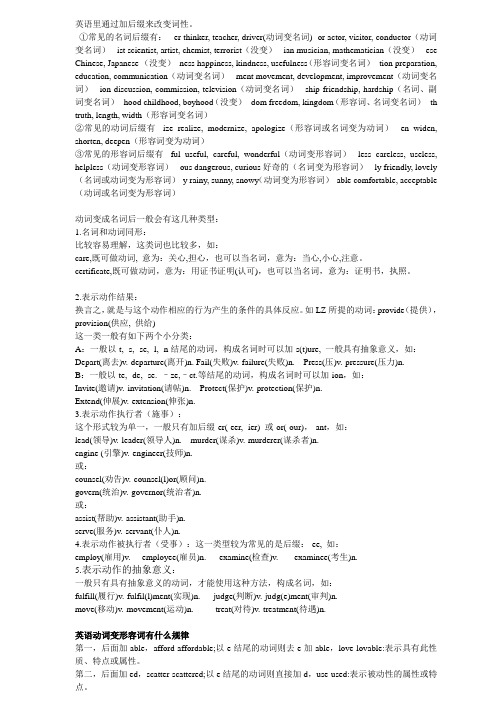
英语里通过加后缀来改变词性。
①常见的名词后缀有:-er thinker, teacher, driver(动词变名词) -or actor, visitor, conductor(动词变名词)-ist scientist, artist, chemist, terrorist(没变)-ian musician, mathematician(没变)-ese Chinese, Japanese (没变)-ness happiness, kindness, usefulness(形容词变名词)-tion preparation, education, communication(动词变名词)-ment movement, development, improvement(动词变名词)-ion discussion, commission, television(动词变名词)-ship friendship, hardship(名词、副词变名词)-hood childhood, boyhood(没变)-dom freedom, kingdom(形容词、名词变名词)-th truth, length, width(形容词变名词)②常见的动词后缀有-ize realize, modernize, apologize(形容词或名词变为动词)-en widen, shorten, deepen(形容词变为动词)③常见的形容词后缀有-ful useful, careful, wonderful(动词变形容词)-less careless, useless, helpless(动词变形容词)-ous dangerous, curious好奇的(名词变为形容词)-ly friendly, lovely (名词或动词变为形容词)-y rainy, sunny, snowy(动词变为形容词)-able comfortable, acceptable (动词或名词变为形容词)动词变成名词后一般会有这几种类型:1.名词和动词同形:比较容易理解,这类词也比较多,如:care,既可做动词, 意为:关心,担心,也可以当名词,意为:当心,小心,注意。
英语单词词性和判断技巧(2)

英语单词词性词性尾缀其实很多,大家主要记住最常用的1. 名词后缀1)-or/er/ess/crat/cis:做某件事情或职业的人或物:worker, debtor2)-acy, 表示"性质,状态,境遇" democr acy, accura cy, diplom acy3)-ance, -ence表示"性质,状况,行为,过程,总量,程度” import ance, dilige nce, differ ence, obedie nce4)-ancy, -ency, 表示"性质,状态,行为,过程" freque ncy, urgenc y, effici ency,5)-bility, 表示"动作,性质,状态" possib ility, flexib ility, feasib ility,6)-dom, 表示"等级,领域,状态" freedo m, kingdo m, wisdom7)-hood, 表示"资格,身份, 年纪,状态" childh ood, manhoo d, falseh ood8)-ion, -sion, -tion, -ation, -ition,表示"行为的过程,结果,状况" action, soluti on, conclu sion, destru ction, expres sion, correc tion9)-ism, 表示"制度,主义,学说,信仰,行为" social ism, critic ism, colloq uiali sm, herois m10)-ity, 表示"性质,状态,程度” purity, realit y, abilit y, calami ty11)-ment, 表示"行为,状态,过程,手段及其结果 treatm ent, moveme nt, judgme nt, punish ment, argume nt12)-ness, 表示"性质,状态,程度" goodne ss, kindne ss, tiredn ess, friend lines s13)-ship, 表示"情况,性质,技巧,技能及身份,职业” hardsh ip, member ship, friend ship14)-th, 表示"动作,性质,过程,状态" depth, wealth, truth, length, growth15)-tude, 表示"性质,状态,程度" latitu de, altitu de(海拔)16)-ure, 表示"行为,结果" exposu re, pressu re, failur e, proced ure(手续),17-grapy,表示"……学,写法” biogra phy, callig raphy, geogra phy18)-ic, ics, 表示"……学……法" logic, mechan ics, electr onics, lingui stics19)-ology,表示"……学……论”biolog y, zoolog y, techno logy(工艺学)20)-nomy, 表示"……学……术" astron omy, econom y, bionom y(生态学)2. 形容词后缀(1)带有“属性,倾向,相关”的含义1)-able, -ible, visibl e, flexib le2)名词-ish, foolis h, bookis h, selfis h(注意accomplis h, vanish)3)-ive, active, sensit ive, produc tive4)-like, manlik e, childl ike5)名词-ly, manly, father ly, schola rly, mother ly6)-some, troubl esome, handso me7)-ful, beauti ful, wonder ful, helpfu l, truthf ul8)-ous, danger ous, genero us, courag eous, variou s9)-ent, violen t10)-most, foremo st, topmos t11)less, 表示否定,countl ess, stainl ess, wirele ss3. 动词后缀1)-ize, ise, 表示"做成,变成,……化“modern ize, mechan ize, democr atize, organi ze2)-en, 表示"使成为,引起,使有” quicke n, weaken, soften, harden3)-fy, 表示"使……化, 使成”beauti fy, purify, intens ify, signif y, simpli fy4)-ish, 表示"使,令” finish, abolis h, dimini sh, establ ish5)-ate, 表示“成为……,处理,作用” separa te, operat e, indica te4. 副词后缀(形容词)-ly:bad→badly坏地/恶劣地,carefu l→carefu lly小心地-wise(OE):clock→clockw ise(a./adv.)顺时针方向的(地);like→likewi se同样地-wards:out→outwar ds向外面地,north→northw ards向北方地单词词性判断可以在词义的理解及书写句子方面帮助学生。
后缀的用法及意义

后缀的用法及意义后缀是指附加在词根后面的一个或多个字母,并且通常具有一定的语法意义。
后缀可以改变一个词的词性、时态、语气、数量以及意义,是构成新词的重要手段。
本文将围绕后缀的用法及意义展开,讨论后缀的分类、作用、举例以及常见错误用法等。
一、后缀的分类及功能1. 后缀的分类后缀可以按照其功能和性质进行分类,一般可以分为名词性后缀、形容词性后缀、动词性后缀和副词性后缀。
名词性后缀主要用于构成名词,常见的有"-er"、"-ist"、"-ment"等;形容词性后缀主要用于构成形容词,常见的有"-able"、"-ful"、"-ish"等;动词性后缀主要用于构成动词,常见的有"-en"、"-ize"、"-ate"等;副词性后缀主要用于构成副词,常见的有"-ly"、"-ward"、"-wise"等。
这些后缀根据其构成的词性不同,具有不同的功能和意义。
2. 后缀的功能后缀的功能主要包括构词、改变词性、表示时态、语气、数量以及意义等。
通过添加不同的后缀,可以使词的含义更加丰富,同时也可以使句子更具表达力和准确性。
二、后缀的用法及意义1. 名词性后缀的用法及意义名词性后缀主要用于构成名词,可以表示人或物的性质、属性、行为、状态等。
常见的名词性后缀包括"-er"、"-ist"、"-ment"、"-tion"等。
根据后缀"-er"构成的名词表示人或物的性质或从事某种行为的人,如"teacher"(老师)、"singer"(歌手);根据后缀"-ist"构成的名词表示某种专业领域的从业人员或信仰者,如"artist"(艺术家)、"scientist"(科学家);根据后缀"-ment"构成的名词表示行为、状态或结果,如"development"(发展)、"enjoyment"(享乐);根据后缀"-tion"构成的名词表示动作、过程或状态,如"education"(教育)、"contribution"(贡献)。
英语词性后缀
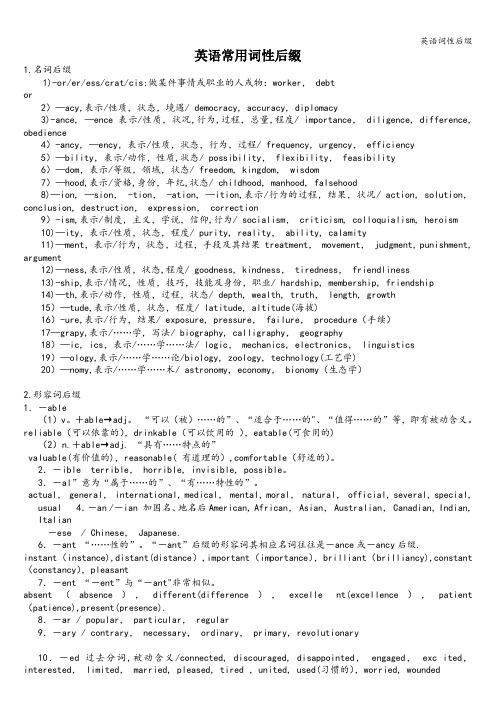
英语常用词性后缀1.名词后缀1)-or/er/ess/crat/cis:做某件事情或职业的人或物:worker, debtor2)—acy,表示/性质,状态,境遇/ democracy, accuracy, diplomacy3)-ance, —ence表示/性质,状况,行为,过程,总量,程度/ importance, diligence, difference, obedience4)-ancy, —ency,表示/性质,状态,行为,过程/ frequency, urgency, efficiency5)—bility,表示/动作,性质,状态/ possibility, flexibility, feasibility6)—dom,表示/等级,领域,状态/ freedom, kingdom, wisdom7)—hood,表示/资格,身份,年纪,状态/ childhood, manhood, falsehood8)—ion, —sion, -tion, -ation, —ition,表示/行为的过程,结果,状况/ action, solution,conclusion, destruction, expression, correction9)-ism,表示/制度,主义,学说,信仰,行为/ socialism, criticism, colloquialism, heroism10)—ity,表示/性质,状态,程度/ purity, reality, ability, calamity11)—ment,表示/行为,状态,过程,手段及其结果 treatment, movement, judgment, punishment, argument12)—ness,表示/性质,状态,程度/ goodness, kindness, tiredness, friendliness13)-ship,表示/情况,性质,技巧,技能及身份,职业/ hardship, membership, friendship14)—th,表示/动作,性质,过程,状态/ depth, wealth, truth, length, growth15)—tude,表示/性质,状态,程度/ latitude, altitude(海拔)16)-ure,表示/行为,结果/ exposure, pressure, failure, procedure(手续)17—grapy,表示/……学,写法/ biography, calligraphy, geography18)—ic, ics,表示/……学……法/ logic, mechanics, electronics, linguistics19)—ology,表示/……学……论/biology, zoology, technology(工艺学)20)—nomy,表示/……学……术/ astronomy, economy, bionomy(生态学)2.形容词后缀1.-able(1)v。
英语基础知识点判断英语词性及发音的方法整理
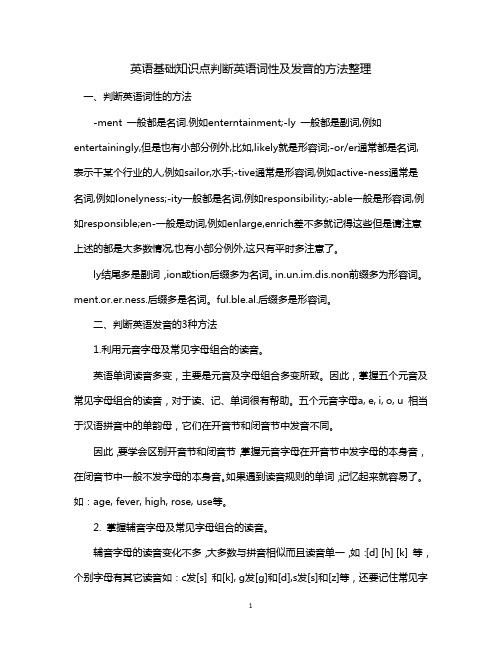
英语基础知识点判断英语词性及发音的方法整理一、判断英语词性的方法-ment 一般都是名词.例如enterntainment;-ly 一般都是副词,例如entertainingly,但是也有小部分例外,比如,likely就是形容词;-or/er通常都是名词,表示干某个行业的人,例如sailor,水手;-tive通常是形容词,例如active-ness通常是名词,例如lonelyness;-ity一般都是名词,例如responsibility;-able一般是形容词,例如responsible;en-一般是动词,例如enlarge,enrich差不多就记得这些但是请注意上述的都是大多数情况,也有小部分例外,这只有平时多注意了。
ly结尾多是副词,ion或tion后缀多为名词。
in.un.im.dis.non前缀多为形容词。
ment.or.er.ness.后缀多是名词。
ful.ble.al.后缀多是形容词。
二、判断英语发音的3种方法1.利用元音字母及常见字母组合的读音。
英语单词读音多变,主要是元音及字母组合多变所致。
因此,掌握五个元音及常见字母组合的读音,对于读、记、单词很有帮助。
五个元音字母a, e, i, o, u 相当于汉语拼音中的单韵母,它们在开音节和闭音节中发音不同。
因此,要学会区别开音节和闭音节,掌握元音字母在开音节中发字母的本身音,在闭音节中一般不发字母的本身音。
如果遇到读音规则的单词,记忆起来就容易了。
如:age, fever, high, rose, use等。
2. 掌握辅音字母及常见字母组合的读音。
辅音字母的读音变化不多,大多数与拼音相似而且读音单一,如:[d] [h] [k] 等,个别字母有其它读音如:c发[s] 和[k], g发[g]和[d],s发[s]和[z]等,还要记住常见字母组合的读音,如sh发[∫],ch发[ts],tr发[tr],dr发[dr],ck发[k]等。
3. 掌握划分音节的方法记忆长单词。
- 1、下载文档前请自行甄别文档内容的完整性,平台不提供额外的编辑、内容补充、找答案等附加服务。
- 2、"仅部分预览"的文档,不可在线预览部分如存在完整性等问题,可反馈申请退款(可完整预览的文档不适用该条件!)。
- 3、如文档侵犯您的权益,请联系客服反馈,我们会尽快为您处理(人工客服工作时间:9:00-18:30)。
-ic 形容词:periodic, cubic立方形的, 立方体的, magnetic磁性的, electronic 名词:critic评论者、批评家, mechanic技工、机 械师, logic逻辑, rhetoric 修辞学
1.具有名词与形容词两种词性的后缀
-ile 形容词 fertile 肥沃的 juvenile 年轻的 fragile 易碎的
名词 Missile---导弹 Textile---纺织品 Automobile
2.同时具有形容词与动词含义的后缀-ish
1. 形容词 1)具有...性质的(通常为贬义) bookish书呆子气的 辨析:childish, childly, childlike manish, manly, manlike 2)稍微的 coldish微冷的, yellowish偏黄的 3)语言 English, Finish, Spanish 2. 动词 establish, diminish使缩小,vanish消失, flourish使 繁荣,使兴旺
eg: society policy storage entrance confidence librarian employee scientist history wisdom actress economics building adventure Marxism
~ian,~ist 表示专业人士, eg:musician,scientist
~er表示占主动地位的人,eg:employer
~ee表站被动地位的人, eg:employee
~ess表示雌性的人或动物,eg:tigeress,actress
~ese表示国籍和语言, eg:chinese ~ics和~logy表示学科 eg: physics biology ~ing表示行业, eg:banking
-tive 形容词:active, passive, positive, negative 名词:detective, representative代表、代表的, relative亲戚, 相关的 例句:Success is a relative term, it brings so many relatives. ----by Bernard Shaw 含义是:一人得道,鸡犬升天。
形容词: 以 able, ous, tic, ful, al, ible, tive, less, like, logical, most, proof, some 结尾 形容词后缀: ~able和~ible表示可以,能够, eg:eatable ~less表示否定, eg:homeless
~like表示像, eg:humanlike
1.具有名词与形容词两种词性的后缀
-ine 形容词:feminine女性的、阴柔的, riverine 河流的 名词:heroine女主角,doctrine教义,routine程 序、常规
-ar 形容词:familiar, similar, linear线性的, peculiar 奇特的 名词:scholar学者, liar说谎者, peddler小贩子,毒 贩 burglar夜贼
~ling表示小的意思, eg:birdling 幼鸟 ~ism表示主义, eg:realism
~ry表示...类, eg:jewelry -都属于不可数名词
1.具有名词与形容词两种词性的后缀
-al 形容词:personal, parental, natural 名词:refusal, proposal, approval, denial, survival, trial
14
1.具有名词与形容词两种词性的后缀
-ant 形容词:ignorant, assistant辅助的, 副的, attendant伴随的, 随之而产生的
名词:examinant主考官, applicant申请者, servant, participant attendant服务人员
1.具有名词与形容词两种词性的后:advisory忠告的, contradictory矛盾的, imaginary虚构的, elementary初级的 名词: inventory库存目录 dormitory宿舍 observatory 天文台 laboratory 实验室 lavatory 盥洗室 dictionary
通过词缀判断词性
动词: 以 en, fy, ize, ate 结尾的词一般都是动词 如 shorten, terrify, realize, maturate 副词: 以 ly 结尾的词大多是副词 (除 friendly, costly, deadly, monthly, weekly, yearly, daily 外 这些词都是形容词) -wise:clock→clockwise(a./adv.)顺时针方向的(地); like→likewise同样地 -wards:out→outwards向外面地, north→northwards向北方地
3. 具有三种词性的后缀
-ly同时具有副词,名词与形容词 副词:namely, similarly, badly严重的、恶劣的 形容词:weekly, friendly, homely, costly 名词:weekly周刊,monthly月刊,quarterly季刊
2014-12-7
~logical表示学科的, eg:biological ~proof表示防...的, eg:fireproof, waterproof ~most表示最...的, eg:easternmost
名词: 以 ty, cy , age, ance, ence, ian, er, ee, ist, ry, or, dom, ess, ese, tion, hood, ics, ing, ism, ling, logy, ment, ness, ship, sion, ture 结 尾
